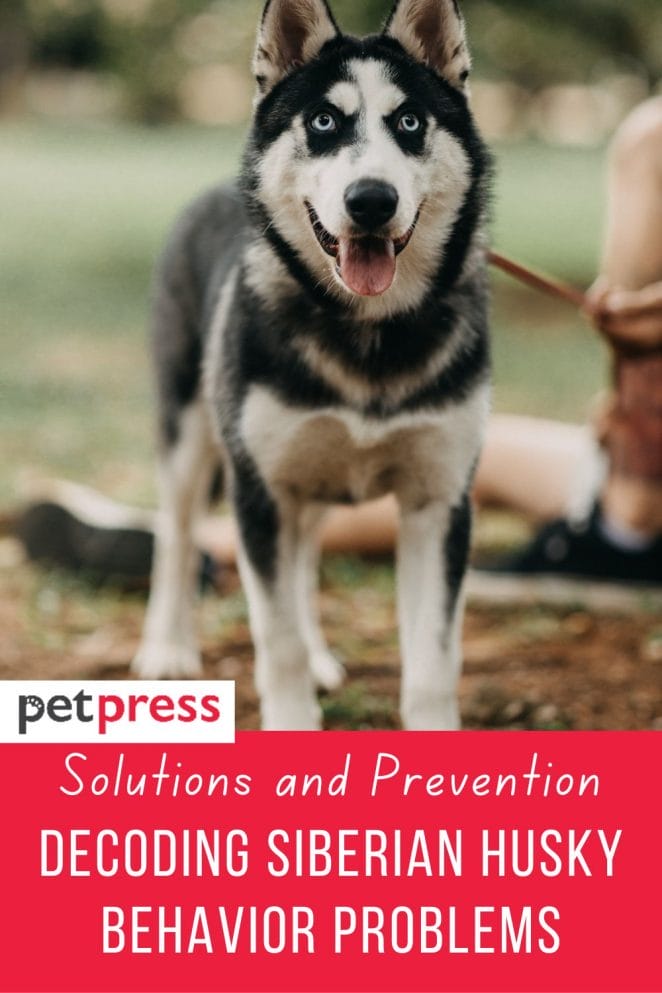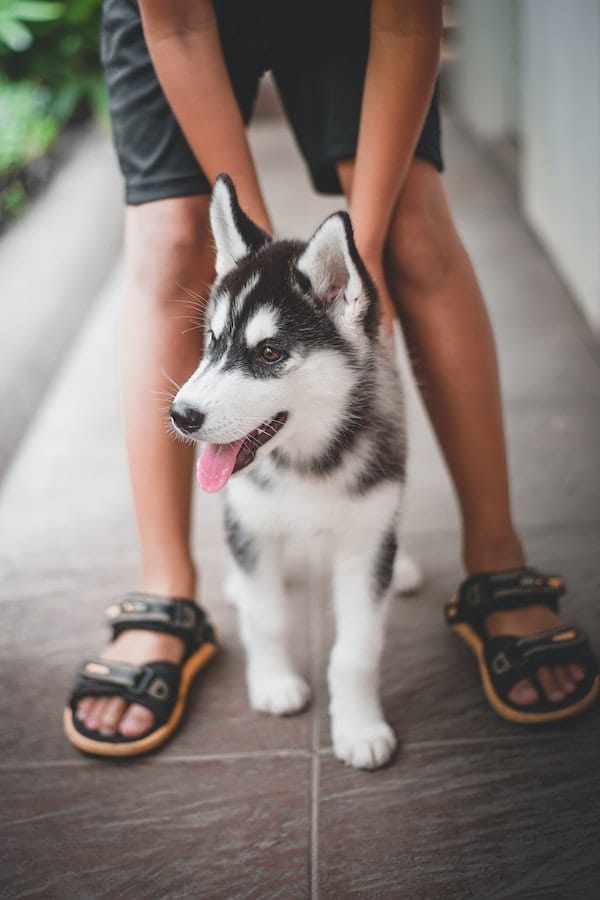
Have you ever found yourself scratching your head, trying to make sense of your Siberian Husky’s quirky behavior?
Well, you’re definitely not alone in that boat. Siberian Huskies are renowned for their distinctive and lively personalities, which can sometimes translate into behavior issues that leave us dog parents a bit puzzled.
In the following pages of this guide, we’re embarking on a journey to delve into the common behavioral challenges that Siberian Husky owners often encounter.
Common Siberian Husky Behavior Problems
Siberian Huskies are known for their independent and strong-willed nature. Here are some of the most common behavior problems you might encounter:
Excessive digging
Siberian Huskies, in all their playful exuberance, have a penchant for digging that can often escalate to the point of creating what might resemble moon craters in your once-pristine yard.
This digging behavior is deeply ingrained in their ancestry as working dogs in cold climates, where they would dig to find shelter or hunt small prey.
Howling and barking
These vocal virtuosos can make quite a symphony with their howls and barks, especially when they’re feeling bored, lonely, or just in the mood to serenade the neighborhood.
Their vocalizations are a part of their communication repertoire, but it can indeed become a bit much for the human ear to handle at times.
Escape artists
Siberian Huskies have earned a reputation as master escape artists, rivaling the legendary Houdini in their knack for slipping through seemingly secure enclosures.
Their adventurous spirit and strong desire for exploration can lead them to find the tiniest gaps or weak spots in fences, making it imperative to invest in secure and Husky-proof fencing.
Chewing
Huskies possess a formidable urge to chew, and they’re not particularly picky about what ends up in their jaws.
This propensity for chewing is both a form of exercise for their powerful jaws and a way to alleviate boredom.
However, if this habit goes unchecked, it can result in some less-than-ideal instances of destructive behavior.
Pulling on leash
Siberian Huskies have an innate prey drive, a genetic inheritance from their sled-pulling ancestors.
This drive can translate into some enthusiastic leash-pulling during walks, as they may be tempted to chase after squirrels, birds, or anything that moves.
Proper leash training is essential to ensure enjoyable and controlled walks with your Husky.
Separation anxiety
Siberian Huskies, renowned for their sociable nature, can often grapple with separation anxiety when left to their own devices.
This emotional turmoil can manifest in various undesirable behaviors, including incessant barking, destructive chewing escapades, and ambitious digging endeavors.
Their attachment to their human companions is deep-rooted, and solitude can be a trigger for this anxiety.

Boredom
The Siberian Husky’s boundless energy and sharp intellect necessitate ample exercise and mental stimulation.
Without these outlets, boredom creeps in, and with it, a potential for destructive behavior.
These dogs thrive on activities that challenge their minds and bodies, and failing to provide such outlets can leave them feeling unfulfilled.
Preying on small animals
Siberian Huskies carry within them the genetic legacy of hunters.
Their strong prey drive, a trait passed down from their ancestors, means they may be inclined to chase and capture small animals such as cats, rabbits, or squirrels.
This can lead to potentially distressing situations if they encounter these creatures during walks or in your backyard.
Aggression
While Siberian Huskies are not typically characterized as aggressive dogs, they can exhibit aggression towards other dogs or people under specific circumstances.
This aggression is often rooted in fear, a sense of territoriality, or a lack of proper socialization.
It’s essential for Husky owners to invest time and effort in socializing their pets from an early age to foster positive interactions with others.
Tips for Preventing Siberian Husky Behavior Problems
Exercise, Exercise, Exercise: Huskies are highly active dogs that require plenty of exercise. Regular walks, runs, and playtime are essential.
Mental stimulation
To counteract the potential for boredom and destructive behavior in Siberian Huskies, it’s imperative to keep their sharp minds engaged.
Puzzles and interactive toys can be invaluable tools for mental stimulation.
These challenges not only provide entertainment but also tap into their problem-solving instincts, helping channel their boundless energy in a constructive manner.
The complexity of these puzzles can introduce an element of perplexity that appeals to their intelligent nature.
Socialization
Early socialization is a vital component in reducing any tendencies towards aggression in Siberian Huskies.
Exposure to various dogs and people during their formative months helps them develop positive and confident interactions.
It minimizes the likelihood of them perceiving unfamiliar situations or individuals as threats.
This multifaceted socialization process adds a burst of experiences to their lives, making them more adaptable and well-adjusted.
Training
Enrolling your Siberian Husky in obedience classes can be a game-changer when it comes to establishing boundaries and reinforcing good behavior.
These classes offer structured training sessions that cater to their specific needs, helping you as a responsible owner to navigate their spirited disposition.
The systematic approach to training imparts a sense of order and discipline, which can significantly enhance their behavior and response to commands.
The blend of consistency and variety in these sessions adds a layer of perplexity and adaptability to their training regimen.
Secure your space
When it comes to Siberian Huskies, who are known escape artists, fortifying your yard with a robust and secure fence is paramount.
Their innate sense of adventure and curiosity can lead them to explore beyond the confines of your property.
To prevent potential escapades and maintain their safety, invest in a sturdy fence that leaves no room for even the most Houdini-like feats of evasion.
This fortification adds an element of reliability to your outdoor space while reducing the burstiness of unexpected escapes.

Chew toys
Recognizing and addressing your Siberian Husky’s natural urge to chew is a key aspect of responsible pet ownership.
Providing a diverse array of appropriate chew toys not only helps curb destructive chewing tendencies but also caters to their innate need for oral stimulation.
Opt for durable, Husky-proof toys that can withstand their powerful jaws, adding an element of longevity to the chew-time equation.
This simple act ensures that their need to chew finds a safe and satisfying outlet, minimizing any burstiness in their destructive tendencies.
Conclusion
Siberian Huskies are undeniably captivating and spirited companions.
However, their distinct behavioral characteristics may present occasional challenges for their owners.
By gaining insight into these common behavioral issues and proactively adopting preventive strategies, you can foster a harmonious and fulfilling relationship with your Husky while ensuring their ongoing happiness and well-being.
FAQs
Huskies are known for howling as it’s a part of their genetic makeup. It’s a way of communicating, and they may howl in response to various stimuli.
Ensure your yard is escape-proof with a tall, secure fence. Additionally, providing mental and physical stimulation can reduce the desire to escape.
Huskies can be a challenge for first-time owners due to their high energy and independent nature. However, with proper training and dedication, they can make wonderful pets.
Crate training can be beneficial to prevent destructive behavior when you’re not around. Providing toys and mental stimulation can also help.


GIPHY App Key not set. Please check settings